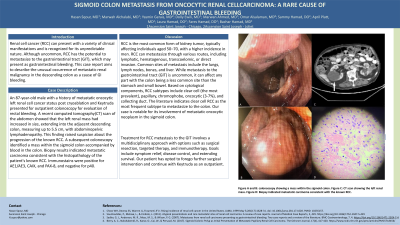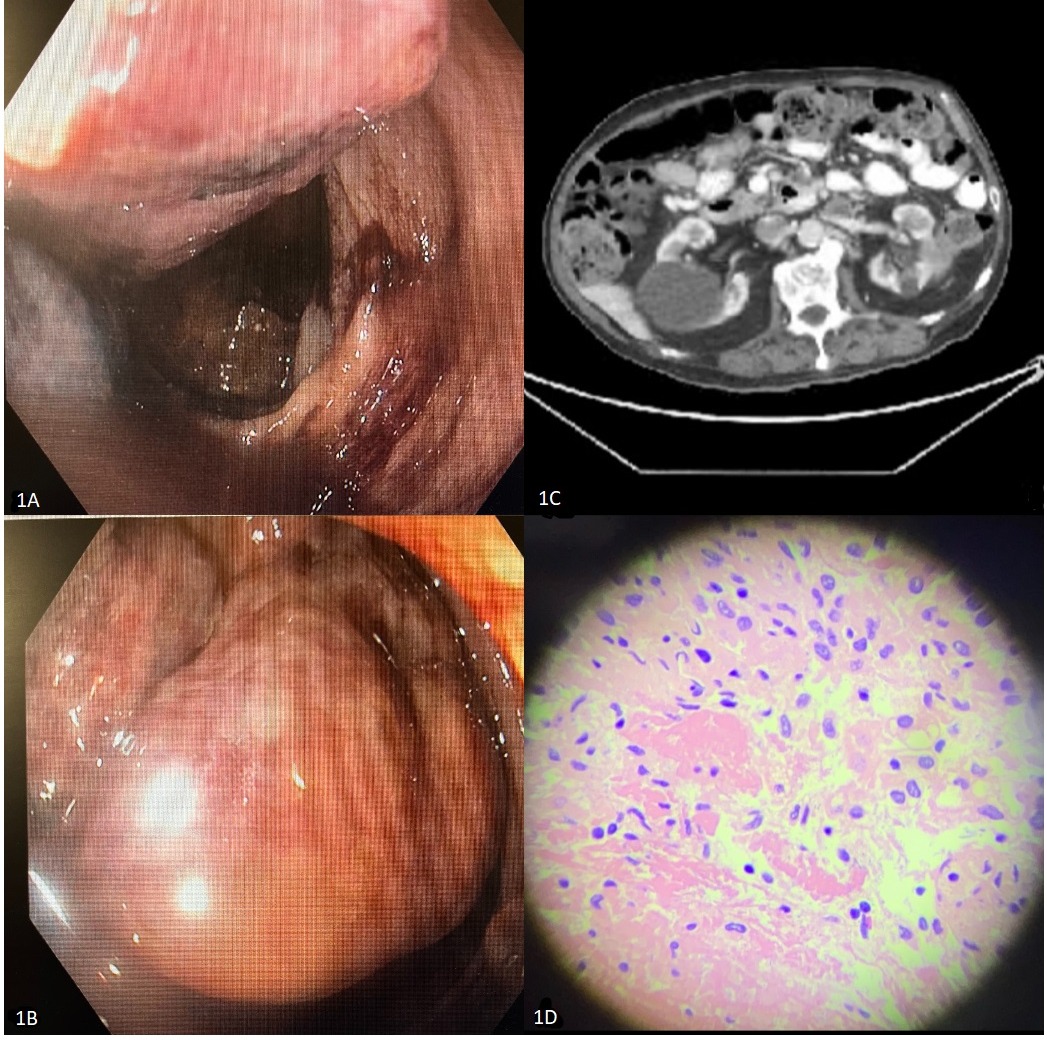Monday Poster Session
Category: GI Bleeding
P2487 - Sigmoid Colon Metastasis From Oncocytic Renal Cell Carcinoma: A Rare Cause of Gastrointestinal Bleeding
Monday, October 28, 2024
10:30 AM - 4:00 PM ET
Location: Exhibit Hall E

Has Audio
- YG
Yasmin Gerais, MD
Ascension Saint Joseph Medical Center
Plainfield, IL
Presenting Author(s)
Hasan Sqour, MD1, Marwah Alchalabi, MD1, Yasmin Gerais, MD2, Dolly Ewili, MD1, Marwan Ahmed, MD1, Omar Alsalman, MD2, Sammy Hamad, DO2, April Platt, MD2, Laura Hamad, DO2, Fares Hamad, DO2, Bachar Hamad, MD3
1Ascension Saint Joseph Hospital, Chicago, IL; 2Ascension Saint Joseph Medical Center, Joliet, IL; 3Ascension Saint Joseph Hospital, Joliet, IL
Introduction: Renal cell cancer (RCC) can present with a variety of clinical manifestations and is recognized for its unpredictable nature. Although uncommon, RCC has the potential to metastasize to the gastrointestinal tract (GIT), which may present as gastrointestinal bleeding. This case report aims to describe the unusual occurrence of metastatic renal malignancy in the descending colon as a cause of GI bleeding.
Case Description/Methods: An 87-year-old male with a history of metastatic oncocytic left renal cell cancer status post cryoablation and Keytruda presented for outpatient colonoscopy for evaluation of rectal bleeding. A recent computed tomography (CT) scan of the abdomen showed that the left renal mass had increased in size, extending into the adjacent descending colon, measuring up to 5.5 cm, with abdominopelvic lymphadenopathy. This finding raised suspicion about the progression of the known RCC. A subsequent colonoscopy identified a mass within the sigmoid colon accompanied by blood in the colon. Biopsy results indicated metastatic carcinoma consistent with the histopathology of the patient's known RCC. Immunostains were positive for AE1/AE3, CAIX, and PAX-8, and negative for p40.
Discussion: RCC is the most common form of kidney tumor, typically affecting individuals aged 50–70, with a higher incidence in men. RCC can metastasize through various routes, including lymphatic, hematogenous, transcoelomic, or direct invasion. Common sites of metastasis include the lungs, lymph nodes, bones, and liver. While metastasis to the gastrointestinal tract (GIT) is uncommon, it can affect any part with the colon being a less common site than the stomach and small bowel. Based on cytological components, RCC subtypes include clear cell (the most prevalent), papillary, chromophobe, oncocytic (3-7%), and collecting duct. The literature indicates clear cell RCC as the most frequent subtype to metastasize to the colon. Our case is notable for its involvement of metastatic oncocytic neoplasm in the sigmoid colon.
Treatment for RCC metastasis to the GIT involves a multidisciplinary approach with options such as surgical resection, targeted therapy, and immunotherapy. Goals include symptom relief, disease control, and extending survival. Our patient has opted to forego further surgical intervention and continue with Keytruda as an outpatient.

Disclosures:
Hasan Sqour, MD1, Marwah Alchalabi, MD1, Yasmin Gerais, MD2, Dolly Ewili, MD1, Marwan Ahmed, MD1, Omar Alsalman, MD2, Sammy Hamad, DO2, April Platt, MD2, Laura Hamad, DO2, Fares Hamad, DO2, Bachar Hamad, MD3. P2487 - Sigmoid Colon Metastasis From Oncocytic Renal Cell Carcinoma: A Rare Cause of Gastrointestinal Bleeding, ACG 2024 Annual Scientific Meeting Abstracts. Philadelphia, PA: American College of Gastroenterology.
1Ascension Saint Joseph Hospital, Chicago, IL; 2Ascension Saint Joseph Medical Center, Joliet, IL; 3Ascension Saint Joseph Hospital, Joliet, IL
Introduction: Renal cell cancer (RCC) can present with a variety of clinical manifestations and is recognized for its unpredictable nature. Although uncommon, RCC has the potential to metastasize to the gastrointestinal tract (GIT), which may present as gastrointestinal bleeding. This case report aims to describe the unusual occurrence of metastatic renal malignancy in the descending colon as a cause of GI bleeding.
Case Description/Methods: An 87-year-old male with a history of metastatic oncocytic left renal cell cancer status post cryoablation and Keytruda presented for outpatient colonoscopy for evaluation of rectal bleeding. A recent computed tomography (CT) scan of the abdomen showed that the left renal mass had increased in size, extending into the adjacent descending colon, measuring up to 5.5 cm, with abdominopelvic lymphadenopathy. This finding raised suspicion about the progression of the known RCC. A subsequent colonoscopy identified a mass within the sigmoid colon accompanied by blood in the colon. Biopsy results indicated metastatic carcinoma consistent with the histopathology of the patient's known RCC. Immunostains were positive for AE1/AE3, CAIX, and PAX-8, and negative for p40.
Discussion: RCC is the most common form of kidney tumor, typically affecting individuals aged 50–70, with a higher incidence in men. RCC can metastasize through various routes, including lymphatic, hematogenous, transcoelomic, or direct invasion. Common sites of metastasis include the lungs, lymph nodes, bones, and liver. While metastasis to the gastrointestinal tract (GIT) is uncommon, it can affect any part with the colon being a less common site than the stomach and small bowel. Based on cytological components, RCC subtypes include clear cell (the most prevalent), papillary, chromophobe, oncocytic (3-7%), and collecting duct. The literature indicates clear cell RCC as the most frequent subtype to metastasize to the colon. Our case is notable for its involvement of metastatic oncocytic neoplasm in the sigmoid colon.
Treatment for RCC metastasis to the GIT involves a multidisciplinary approach with options such as surgical resection, targeted therapy, and immunotherapy. Goals include symptom relief, disease control, and extending survival. Our patient has opted to forego further surgical intervention and continue with Keytruda as an outpatient.

Figure: Figure 1A and 1B: colonoscopy showing a mass within the sigmoid colon.
Figure 1C: CT scan showing the left renal mass.
Figure 1D: Biopsy indicated metastatic carcinoma consistent with the known RCC.
Figure 1C: CT scan showing the left renal mass.
Figure 1D: Biopsy indicated metastatic carcinoma consistent with the known RCC.
Disclosures:
Hasan Sqour indicated no relevant financial relationships.
Marwah Alchalabi indicated no relevant financial relationships.
Yasmin Gerais indicated no relevant financial relationships.
Dolly Ewili indicated no relevant financial relationships.
Marwan Ahmed indicated no relevant financial relationships.
Omar Alsalman indicated no relevant financial relationships.
Sammy Hamad indicated no relevant financial relationships.
April Platt indicated no relevant financial relationships.
Laura Hamad indicated no relevant financial relationships.
Fares Hamad indicated no relevant financial relationships.
Bachar Hamad indicated no relevant financial relationships.
Hasan Sqour, MD1, Marwah Alchalabi, MD1, Yasmin Gerais, MD2, Dolly Ewili, MD1, Marwan Ahmed, MD1, Omar Alsalman, MD2, Sammy Hamad, DO2, April Platt, MD2, Laura Hamad, DO2, Fares Hamad, DO2, Bachar Hamad, MD3. P2487 - Sigmoid Colon Metastasis From Oncocytic Renal Cell Carcinoma: A Rare Cause of Gastrointestinal Bleeding, ACG 2024 Annual Scientific Meeting Abstracts. Philadelphia, PA: American College of Gastroenterology.
